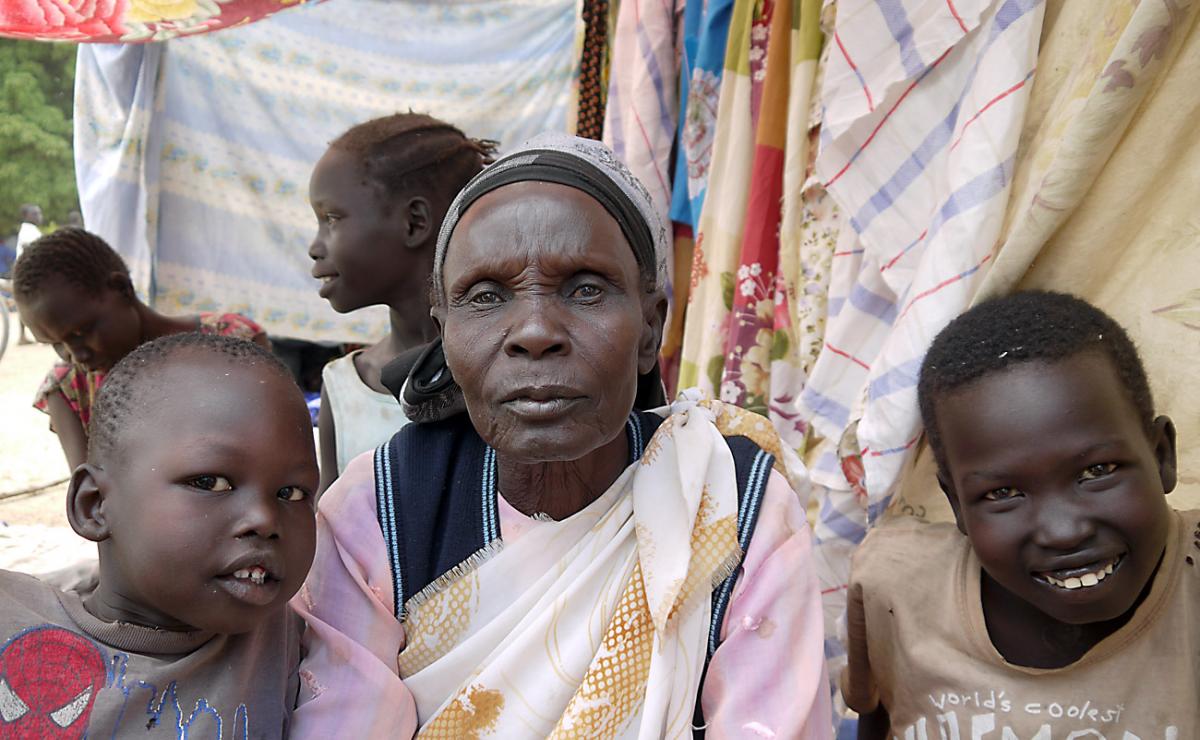Massive Influx of South Sudanese Refugees into Uganda Calls for Scaled-Up Humanitarian Response

LWF to Increase Support for Thousands Arriving Daily
(LWI) –Within three days, the number of refugees from South Sudan entering Adjumani in northern Uganda had doubled to reach 24,105 people by 9 January. The high influx puts high pressure on Ugandan camps and calls for a scaling-up of humanitarian response. The Lutheran World Federation (LWF), a member of ACT Alliance is providing refugees with soap and utensils, and plans additional support with water, sanitation, hygiene and shelter and other non-food items.
“Water is a big problem here. I have not showered for over seven days—just look at my feet,” says 61-year-old Tabisa Nyabol pointing at her feet. Nyabol, seated with her grandchildren under a shade from a couple of blankets, arrived on 1 January. “We have not yet been registered anywhere, we are so many people,” she says, lifting up her hands as though in despair.
Nyabol is among the thousands of refugees who escaped the recent fighting in South Sudan and arrived at the Dzaipi reception center in Adjumani district, northern Uganda. “When I heard the gunshots from my home in Bor (Jonglei state), I was sleeping with my grandchildren, we started running. My son was killed. He did not know I had gone and tried to run back to save me,” Nyabol says.
“I have not only lost my son, but I also lost everything at home, the rebels took my 30 cows and 10 goats,” says Nyabol, who did not manage to carry along any of her belongings. Together with her grandchildren, she walked for more than two days and traveled several days by boat and truck escaping the conflict.
The unfolding political crisis in South Sudan started on 15 December 2013. The fighting that followed has resulted in massive population movements inside the young country with an estimated 300,000 people displaced internally, according to the United Nations High Commissioner for Refugees (UNHCR), and around 60,000 fleeing into neighboring Ethiopia, Kenya and Uganda. The UN refugee agency anticipates the number of refugees could rise to 125,000 and those internally displaced could reach 400,000.
Additional Support Needed
As of 9 January, Uganda had received more than 32,000 South Sudanese, and the numbers continue to swell with between 4,000 and 5,000 refugees arriving daily.
“There are so many areas of intervention that we need support in. The Dzaipi reception center is overcrowded and we have given ourselves a week to make sure it is cleared and people are resettled in permanent settlements. The biggest problems are water, hygiene, sanitation and food,” says Titus Jogo, emergency coordinator, Uganda Office of the Prime Minister (OPM).
The LWF was among the first to arrive at the reception center and has supported the refugees with basic needs. “We have so far brought seven tons of laundry soap, 2,000 cups and 2,000 plates as a start, but we are waiting for UNHCR and OPM to ensure coordination in the distribution,” says Eugen Emuron, LWF emergency coordinator.
“Right now the number of refugees is high, and there are many new arrivals every day. The biggest challenge is shelter, water, sanitation and hygiene,” says Cathy Mavenjina, UNHCR senior community service assistant.
LWF plans additional support including water, sanitation and hygiene (WASH) and distribution of non-food items such as cooking and serving utensils, water containers, soap and blankets, as well as shelters and offering psycho-social support.
(A contribution by Mai Gad and Agnete Rishoej)

